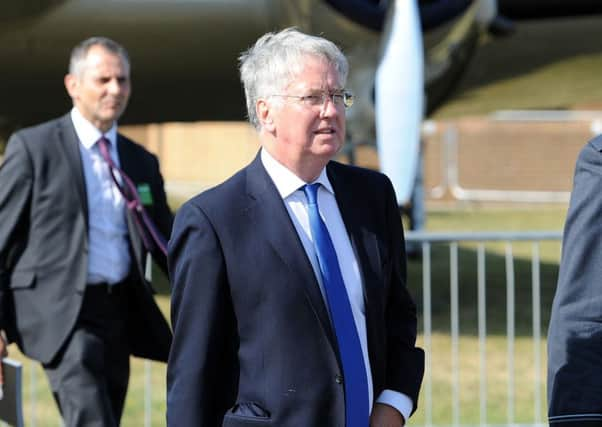Leaders: Conservatives made to look very bad again


There is no doubt that IS is a horrific and barbaric organisation that poses a clear and present danger to everyone it deems an enemy, and that amounts to just about everyone who is not IS. Airstrikes against this menace are to be welcomed, in fact there is a compelling case to increase military action against it by the alliance of nations ranged against it.
Airstrikes against it in Iraq are well known and well publicised and generally have the widespread approval of the public. But now it has emerged that British service personnel attached to other nation’s air forces have been taking part in the Syrian raids.
Advertisement
Hide AdAdvertisement
Hide AdIt was at most three pilots, so it is hardly black operations on an industrial scale. So if they hit the right enemy and were fighting alongside our allies where has the government committed a wrongdoing? The trouble the government has is that parliament was specifically asked to back air operations in Syria in 2013 and in a massively humiliating defeat for Prime Minister David Cameron the house voted 285-272 against it.
Three pilots attached to other air forces might seem like a minor transgression, but the bigger crime lies in the government’s reaction to the raids being uncovered. The actions of allowing these raids to go on, and it is admitted Mr Cameron knew, without either stopping them or bringing them to the attention of the House of Commons simply shows a contempt for parliament, and frankly the Tories do not need any more evidence that shows them dealing in a high-handed manner.
The argument that it is common practice for such personnel swaps, and therefore anything that British personnel undertake on them is acceptable is completely specious. The suggestion that because these service personnel are in the chain of command of another power so they somehow cease to be British or answerable to Britain’s military chiefs is ridiculous.
There have been suggestions that the 2013 parliamentary vote does not count, because in that instance MPs were voting on whether to allow strikes against president Bashar al-Assad’s regime in Syria in a bid to deter the use of chemical weapons.
But the fact is that parliament’s will was that British forces should not engage in military action in Syria and Mr Cameron said he would abide by that and that British forces would not join the US in raids and now they have.
It does not matter that what the service personnel did was right. As soon as the government became aware of it, out of respect to parliament and for the sake of transparency and honesty they should have brought this to the attention of the House of Commons.
Interest rate rise is coming
Interest rates are usually seen as snakes and ladders - some winners some losers. When they rise those who have savings will see the earnings from those savings increase and people with repayments like mortgages will see the money going out increase. The reality is many people will have some savings and some repayments - but for most the biggest item will be repayments.
And that is where the danger lies. Many readers will remember the early 1990’s when interest rates set by the government soared to a high of 15 per cent and mortgage payments increased leading to a collapse in the housing market and recession.
Advertisement
Hide AdAdvertisement
Hide AdIt was a direct consequence of this that the setting of interest rates was given to the Bank of England in the hope of avoiding any furthers booms and busts.
So what Mr Carney is now talking about is nowhere near on that scale, and the economic climate back in the 1980s and 90s was very different to the one we live in now, with zero inflation and only neasured confidence. Mr Carney is speaking for a reason, it is what is often referrred to as conditioning. The market hates shocks, so Mr Carney’s policy is to say what’s on his mind as he looks a long way in to the future. He is preparing us and the markets for an interest rate rise. He has done so before and no rise actually happened, but he probably feels it is better that way round than the alternative.
There is one certaintly in this: ineterest rates will rise. They will not stay at the current rate forever. What they will rise to and when is not known, but some forrthought to the eventuality of a rise will make that rise have less of an impact.